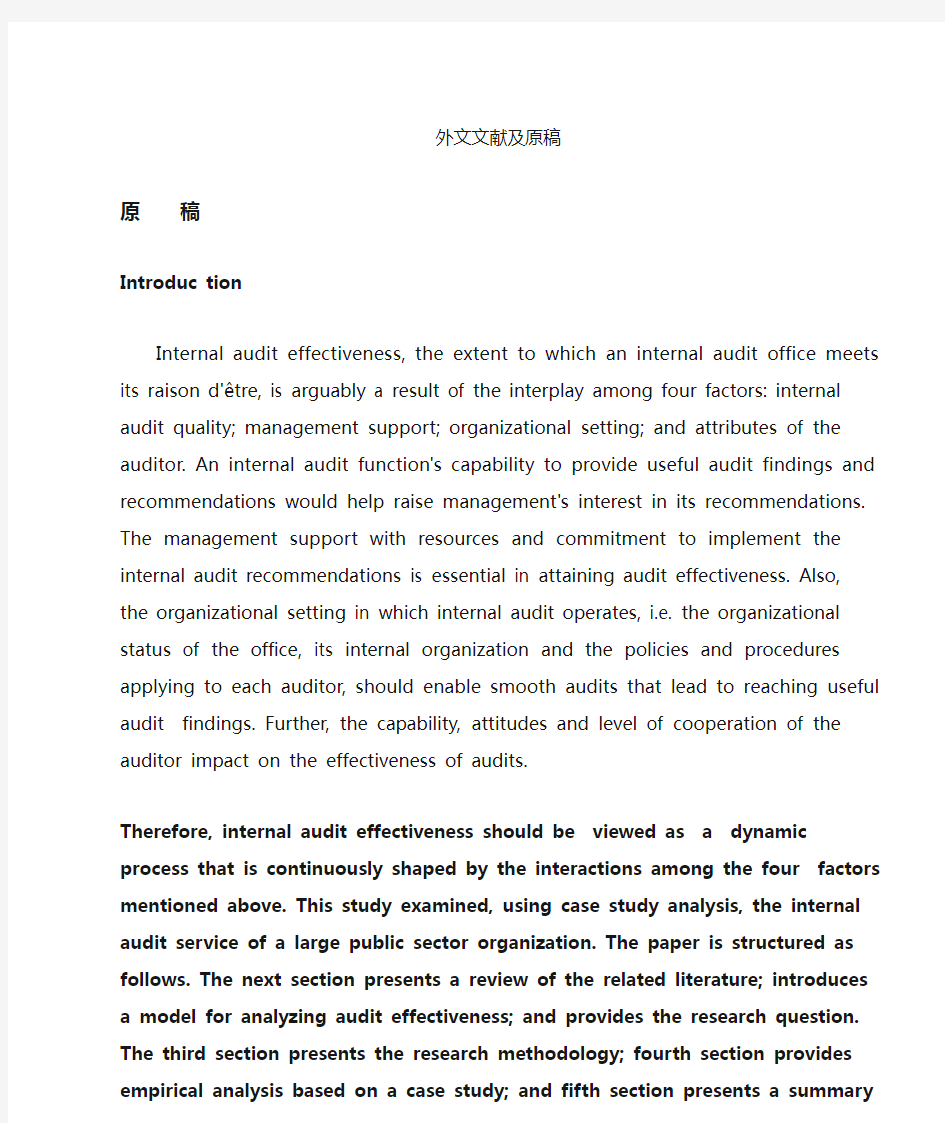内部审计外文文献翻译

- 1、下载文档前请自行甄别文档内容的完整性,平台不提供额外的编辑、内容补充、找答案等附加服务。
- 2、"仅部分预览"的文档,不可在线预览部分如存在完整性等问题,可反馈申请退款(可完整预览的文档不适用该条件!)。
- 3、如文档侵犯您的权益,请联系客服反馈,我们会尽快为您处理(人工客服工作时间:9:00-18:30)。
外文文献及原稿
原稿
Introduction
Int ernal a ud it ef fe ctive n e s s, t h e ext e nt t o whic h an inte r nal a udit offic e me e ts i ts ra ison d'êt re, i s a r guably a result o f the i n t e rpla y a mong four fa c tors: in t erna l audi tq uali t y; management support; or gani z at i onal sett i ng; and attributes of the audi t or.An i nt ern al audit func t ion's capabil i ty to provi de us eful a udi t findi ngs and re commendations w oul d help ra isemanagement'sintere s ti n it s re c omm e ndation s.T he m a na gementsupportw i thresourcesandc om mi t me nt to i mplement t heinternal a udi t reco m me nd ationsi s essenti a l in attainingaudit e ffec t ive ne s s.
A l s o,the o rganizati o nals et ting i n w hi c h i ntern a laudit ope rat e s,i.e.t he or ga nizatio na ls t at us ofth eof fi ce,i t si nt erna lor ganizatio n andthepoli c ie s andpr oc edure s applyi ng t o eachaudi t o r, sho ul d enable smooth audi t s t ha t l ea d to reaching us e f ul a udi tfindings.Furth e r,thecapab i li t y,at t itudesandl e velofcoopera t ionoftheaudi t or i mpacton t heeffec t ive ne ss ofaud i ts.
T herefore, internal audit ef fe ct i veness s houl d be vie w e d as a dynamicprocessthat is c ontinuously s ha ped by t h e interac t ions among t he fo ur factors me ntionedabove.Thi s s t udy e xami n ed,u singcasestudyan a lysis,t heint e rnala udi ts e rvic eof ala rgepublicsectororganization.Thepaperisstructuredasfollows.Thenextsectionpresents a review of the related literature; introduces a model for analyzingauditeffectiveness; and provides the research question. The third section presentstheresearch methodology; fourth section provides empirical analysis based on acasestudy; and fifth section presents a summary of the findings. The paperthensummarizes the conclusions, noting limitations of the study and suggesting avenuesfor futureresearch. Internalauditeffectiveness
The Instituteof Internal Auditors (IIA, 1999a) defined internal auditing as:an independent, objective assurance and consulting activity designed to add valueandimprove an organization's operations. It helps an organization accomplish itsobjectives by bringing a systematic, disciplined approach to evaluate and improvetheeffectiveness of risk management, control, and governanceprocesses.
This definition signifies that internal audit has undergone a paradigmshift froman emphasis on accountability about the past to improving future outcomes tohelpauditors operate more effectively and efficiently (Nagy and Canker, 2002; Stern,1994;Goodwin, 2004). Since, the definition equally serves both the private and thepublicsectors (Goodwin, 2004), it is used in this study as a basis to analyze publicsectorinternal auditeffectiveness.
Internal audit is effective if it meets the intended outcome it is supposed tobringabout.Sawyer(1995)states,“…internalauditor'sjobisnotdoneuntildefectsarecorrecte d and remain corrected.”Van Hansberger (2005) explains that internalauditeffectiveness in the public sector should be evaluated by the extent to whichitcontributes to the demonstration of effective and efficient service delivery, asthisdrives the demand for improved internal audit services. Based on the results ofaconsultative forum that focused on improving public sector internal audit [1],VanHansberger (2005) identified perceptionsandownership; organizationandgovernance framework; legislation; improved professionalism; conceptualframework;and also resources as factors influencing internal audit effectiveness.Effectiveinternal audit undertakes an independent evaluation of financial andoperatinginformation and of systems and procedures, to provide useful recommendationsfor improvements asnecessary.
The effectiveness of internal audit greatly contributes to the effectiveness ofeachauditor in particular andthe organization at large (Dittenhofer, 2001).Dittenhofer(2001) has also observed that if internal audit quality is maintained, it will contributeto the appropriateness of procedures and operations of the auditor, and therebyinternal audit contributes to effectiveness of the auditor and the organization asawhole. Using agency theory, Dingdong (1997) explained the role that internalauditplays in an economy and points out that internal audit has an advantage over external
